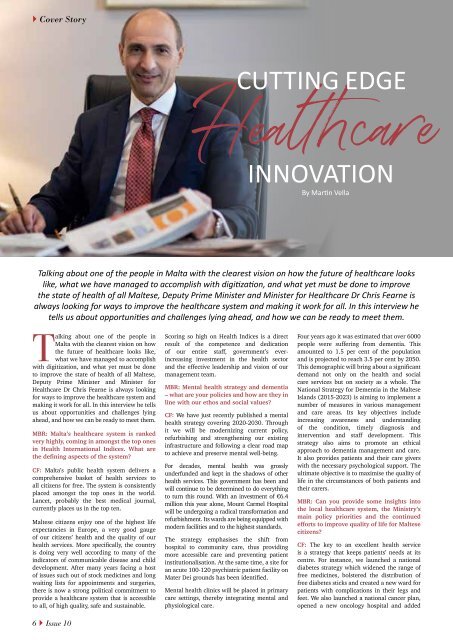MAINSAIL_low res-compressed
You also want an ePaper? Increase the reach of your titles
YUMPU automatically turns print PDFs into web optimized ePapers that Google loves.
} Cover Story<br />
CUTTING EDGE<br />
INNOVATION<br />
By Martin Vella<br />
Talking about one of the people in Malta with the clea<strong>res</strong>t vision on how the future of healthcare looks<br />
like, what we have managed to accomplish with digitization, and what yet must be done to improve<br />
the state of health of all Maltese, Deputy Prime Minister and Minister for Healthcare Dr Chris Fearne is<br />
always looking for ways to improve the healthcare system and making it work for all. In this interview he<br />
tells us about opportunities and challenges lying ahead, and how we can be ready to meet them.<br />
Talking about one of the people in<br />
Malta with the clea<strong>res</strong>t vision on how<br />
the future of healthcare looks like,<br />
what we have managed to accomplish<br />
with digitization, and what yet must be done<br />
to improve the state of health of all Maltese,<br />
Deputy Prime Minister and Minister for<br />
Healthcare Dr Chris Fearne is always looking<br />
for ways to improve the healthcare system and<br />
making it work for all. In this interview he tells<br />
us about opportunities and challenges lying<br />
ahead, and how we can be ready to meet them.<br />
MBR: Malta’s healthcare system is ranked<br />
very highly, coming in amongst the top ones<br />
in Health International Indices. What are<br />
the defining aspects of the system?<br />
CF: Malta’s public health system delivers a<br />
comprehensive basket of health services to<br />
all citizens for free. The system is consistently<br />
placed amongst the top ones in the world.<br />
Lancet, probably the best medical journal,<br />
currently places us in the top ten.<br />
Maltese citizens enjoy one of the highest life<br />
expectancies in Europe, a very good gauge<br />
of our citizens’ health and the quality of our<br />
health services. More specifically, the country<br />
is doing very well according to many of the<br />
indicators of communicable disease and child<br />
development. After many years facing a host<br />
of issues such out of stock medicines and long<br />
waiting lists for appointments and surgeries,<br />
there is now a strong political commitment to<br />
provide a healthcare system that is accessible<br />
to all, of high quality, safe and sustainable.<br />
6 } Issue 10<br />
Scoring so high on Health Indices is a direct<br />
<strong>res</strong>ult of the competence and dedication<br />
of our entire staff, government’s everincreasing<br />
investment in the health sector<br />
and the effective leadership and vision of our<br />
management team.<br />
MBR: Mental health strategy and dementia<br />
– what are your policies and how are they in<br />
line with our ethos and social values?<br />
CF: We have just recently published a mental<br />
health strategy covering 2020-2030. Through<br />
it we will be modernizing current policy,<br />
refurbishing and strengthening our existing<br />
infrastructure and fol<strong>low</strong>ing a clear road map<br />
to achieve and p<strong>res</strong>erve mental well-being.<br />
For decades, mental health was grossly<br />
underfunded and kept in the shadows of other<br />
health services. This government has been and<br />
will continue to be determined to do everything<br />
to turn this round. With an investment of €6.4<br />
million this year alone, Mount Carmel Hospital<br />
will be undergoing a radical transformation and<br />
refurbishment. Its wards are being equipped with<br />
modern facilities and to the highest standards.<br />
The strategy emphasises the shift from<br />
hospital to community care, thus providing<br />
more accessible care and preventing patient<br />
institutionalisation. At the same time, a site for<br />
an acute 100-120 psychiatric patient facility on<br />
Mater Dei grounds has been identified.<br />
Mental health clinics will be placed in primary<br />
care settings, thereby integrating mental and<br />
physiological care.<br />
Four years ago it was estimated that over 6000<br />
people were suffering from dementia. This<br />
amounted to 1.5 per cent of the population<br />
and is projected to reach 3.5 per cent by 2050.<br />
This demographic will bring about a significant<br />
demand not only on the health and social<br />
care services but on society as a whole. The<br />
National Strategy for Dementia in the Maltese<br />
Islands (2015-2023) is aiming to implement a<br />
number of measu<strong>res</strong> in various management<br />
and care areas. Its key objectives include<br />
increasing awareness and understanding<br />
of the condition, timely diagnosis and<br />
intervention and staff development. This<br />
strategy also aims to promote an ethical<br />
approach to dementia management and care.<br />
It also provides patients and their care givers<br />
with the necessary psychological support. The<br />
ultimate objective is to maximise the quality of<br />
life in the circumstances of both patients and<br />
their carers.<br />
MBR: Can you provide some insights into<br />
the local healthcare system, the Ministry’s<br />
main policy priorities and the continued<br />
efforts to improve quality of life for Maltese<br />
citizens?<br />
CF: The key to an excellent health service<br />
is a strategy that keeps patients’ needs at its<br />
centre. For instance, we launched a national<br />
diabetes strategy which widened the range of<br />
free medicines, bolstered the distribution of<br />
free diabetes sticks and created a new ward for<br />
patients with complications in their legs and<br />
feet. We also launched a national cancer plan,<br />
opened a new oncology hospital and added
















